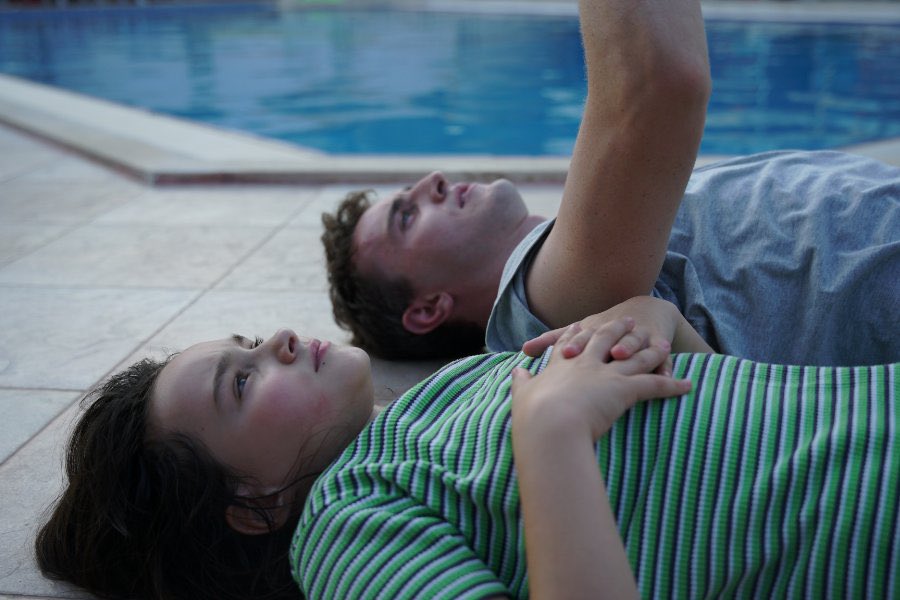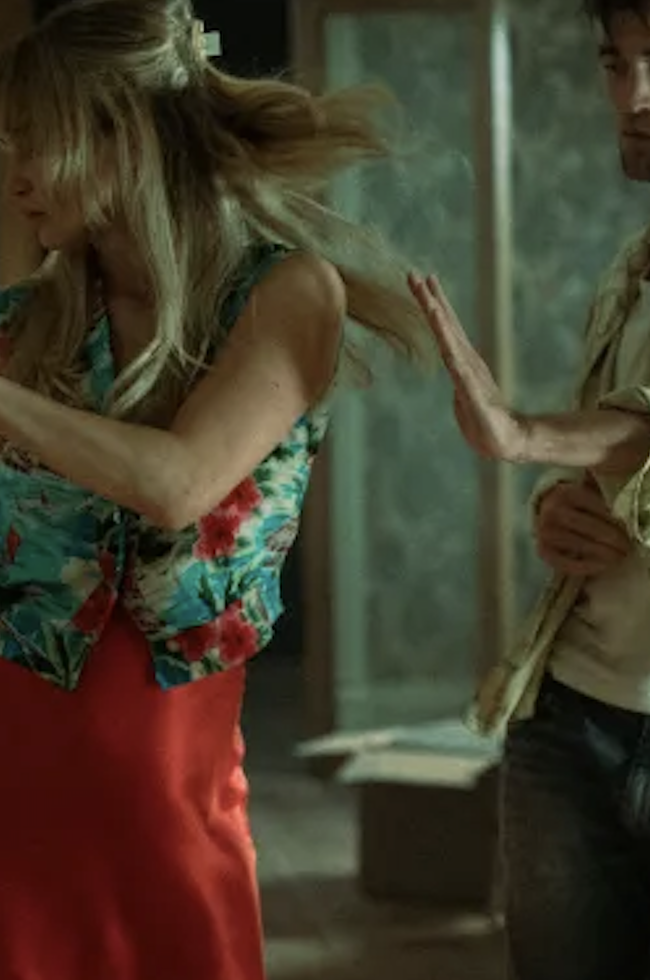AFTERSUN

(The 60th New York Film Festival (NYFF) runs September 30-October 16. Check out M.J. O’Toole’s movie review of Aftersun. Seen it? Join the conversation with HtN on our Letterboxd Page.)
Do we often look back on our memories in a more subjective way? Choosing to remember loved ones based on how we feel about one particular event in our lives? Writer-director Charlotte Wells addresses these questions in her intimately poetic feature debut, Aftersun. A somewhat autobiographical tale that is set in the late 90s, Paul Mescal (who broke out just a few years ago with Normal People) and newcomer Frankie Corio star as a Scottish father and daughter who take a vacation to a Turkish resort. The film immerses us in the lives of the two over the course of the week-long holiday, while aptly experimenting with time and mood that fills the viewer with a sense of both bliss and melancholy.
Mescal is exceptional as Calum, a young father who takes advantage of a vacation package with his 11-year-old daughter Sophie (an endearing Corio) so they can spend time together a week before the summer ends. The most candid parts of their trip are experienced through the lens of an old Sony DV camcorder Calum owns, which only shows a portion of their close bond. Sophie lives in Scotland with her mother, while Calum resides in England with no intention of returning to his home country, even if it would bring him closer to his child. Sophie is witty and mature beyond her years, so much that she prefers to hang out with hard-drinking teenage tourists rather than kids her own age, with the exception of a boy she meets on a motorbike game in the resort’s arcade. Despite his youthful appearance and personality, Calum is still able to embarrass his daughter in pure dad fashion with his disco moves and constant Tai Chi practicing. The film doesn’t dawdle on the duo’s personal lives and history prior to the trip, so the viewer is left to piece things together from their chemistry and flashes of detail given in small doses.
Despite her spunky, mature attitude, Sophie still has a childlike curiosity about certain things, such as why her dad says “love ya” to her mom (his ex-wife) over the payphone or what the teenagers at the resort gossip about. But one thing Sophie is unaware of is her dad secretly suffers from depression that he tries to hide from her. Those with emotional perception can feel both sympathy and concern for Calum, especially in regard to how his emotional state impacts his care for Sophie. “I’m not sure if I’ll make it to 40,” he tells a resort employee. “I’m surprised I even made it to 30.” Much similar to his performance in Normal People, Mescal is superb as someone dealing with a deep sadness who is unable to open up about it even to the person closest to him and is overwhelmed by guilt because of his neglect. It’s easy to ask why these characters feel a certain way, but Wells doesn’t care about the answers, and instead has us experience it through the eyes of her young protagonist.
In between the sun-filled vacation, the film seamlessly transitions to shots of an older Sophie (Celia Rowlson-Hall) looking back on her journey with her father. We don’t know much about her or the life she lives, but her demeanor seems like a 180 from the 11-year-old child we have gotten to know. In a very dreamlike aesthetic, Wells conjures up shots in a nightclub concert space that seems to serve as a realm between the past and present. Grown-up Sophie sees her father, the same age, and tries to reach him as if she’s trying to grab onto something of the past that eludes her. The crafting of these moments throughout the film is reminiscent of Well’s fellow Scottish filmmaker, Lynne Ramsay. Wells excels in trying to materialize the theme of memory and our connection to the past through these sequences, working with editor Blair McClendon to weave an impressionistic tapestry. Gregory Oke’s sun-bleached cinematography evokes both the euphoria and sadness from the two time periods.
Someone referred to this film as an “arthouse Paper Moon,” but unlike Ryan and Tatum O’Neal, Mescal and Corio’s performances mainly rest on their ability to play off one another through their candid moments, whether teasing, a deep conversation, or lathering sunscreen or mud on one another. Their rapport is wonderful, and Wells’ direction lets it play out naturally. The moments intercut with DV footage help the viewer feel even more immersed, settling into the tender lives of this father-daughter duo.
Aftersun is not the kind of film where you expect a clear & concise beginning, middle, and end, but one that has you experience these characters’ lives as they are at a certain point in time. It is not clear what happens in the time that passes between Sophie’s trip to Turkey and her adulthood, but it shows how she chooses to remember her father. In Aftersun, Wells blurs the line between how we choose to remember our loved ones and who they really were. Though small in scope, it is an empathetic and breathtaking piece of cinema and a great start for an exciting new filmmaker.
– M.J. O’Toole (@mj_otoole93)
2022 New York Film Festival; Charlotte Wells; Aftersun movie review











